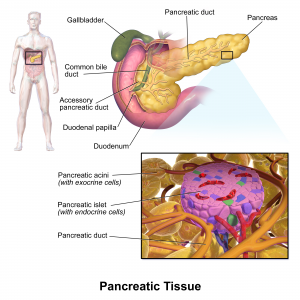Pancreatitis is a disease that causes the pancreas to become inflamed. It can either be acute or chronic. Acute pancreatitis occurs when the pancreas becomes suddenly inflamed, which only lasts for a few days. Symptoms can be mild, severe, and even life-threatening. With proper treatment, acute pancreatitis can be treated. But if acute pancreatitis is left untreated, this can lead to infection, bleeding, cysts, or severe tissue damage, and can also being to affect the kidneys, heart, or lungs. Chronic pancreatitis occurs when the pancreas remains inflamed for a long period of time. This type of pancreatitis often occurs as a result of acute pancreatitis, or after long-term excessive alcohol consumption.

Symptoms of acute pancreatitis may include upper left abdominal pain that radiates to the back, fever, nausea and vomiting, increased heart rate, and swollen or tender abdomen. Symptoms of chronic pancreatitis may be similar, although the upper abdominal pain is usually more persistent and severe, weight loss may occur, and you may develop diabetes.
Acute pancreatitis is most often caused by gallstones or excessive alcohol use. Gallstones can trigger an acute attack when they leave the gallbladder and get stuck on the common bile duct. When an attack occurs with excessive drinking, it usually happens within a few hours up to two days. It may also be caused by high levels of fat or calcium in the blood, abdominal trauma, an infection, certain medications such as estrogen or steroids, or metabolic disorders. Chronic pancreatitis is also most often caused by gallstones or long-term, excessive alcohol use. It may also be caused by cystic fibrosis, certain medications, hereditary pancreatic disorders, or if you have high triglyceride levels.
Acute pancreatitis caused by gallstones can be treated by removing the gallbladder, or with surgery of the bile duct. If the acute pancreatitis is caused by something else, it may be treated with various pain medication and intravenous fluids. If the pancreatitis becomes severe, you may have to stay in the intensive care unit to monitor other organs it may affect such as the kidneys, lungs, and heart. If the disease becomes severe enough to damage pancreatic tissue, you may need surgery to remove the damaged tissue.
Chronic pancreatitis is more difficult to treat. Your doctor will usually focus on treating the symptoms with pain medication, insulin, pancreatic enzymes, and recommending a low-fat diet. When chronic pancreatitis becomes severe, surgery can help reduce the associated abdominal pain and frequency of pain, restore drainage of hormones or enzymes, or to open a blockage in the pancreatic duct.
Tips to prevent pancreatitis:
- Avoid smoking
- Avoid excessive alcohol consumption, or alcohol in general
- Eat a low-fat diet. Aim for whole grains, fruits and vegetables. Avoid foods high in fat such as fried foods or full-fat dairy products, or high in sugar. These can raise your triglyceride levels and cholesterol which may cause gallstones to form.
- Get regular exercise to maintain a healthy weight, or lose weight if necessary




I think this is an important article to read and understand for general health purposes. As a younger person and a college student, I am naturally exposed to more alcohol. All to frequently, I see it over consumed and grossly misused. Alcohol abuse, just like many other various substances, has longer-term harmful effects that a younger generation seems to persistently ignore. A good diet is also important for general health and wellbeing, and can only help avoid pancreatitis.
Thank you for all the information and the depth of your explanations. This is extremely helpful for people who have symptoms and knowing when to go see a doctor.